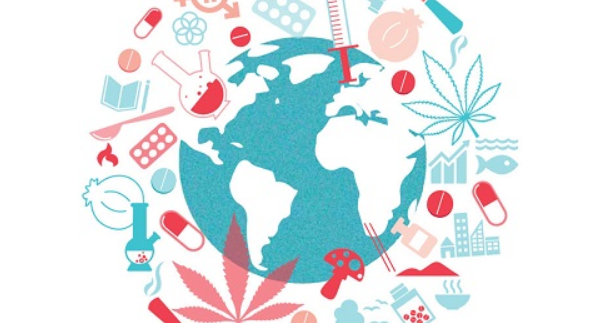UN Quietly Supports Shift Toward Decriminalization of Marijuana and Other Psychoactive Substances
A recently published report by the International Narcotics Control Board (INCB), an intergovernmental expert committee under the United Nations, contains several noteworthy recommendations that signal the organization’s unofficial agreement on the need to change the drug policy course in many countries, particularly regarding marijuana. Specifically, one recommendation urges governments worldwide to refrain from imposing criminal penalties on individuals who are simply users of banned substances. Another advises countries to hold off on full legalization campaigns for marijuana until the UN can amend the old conventions to allow such reforms among member nations.
These proposals are drawn from the latest annual INCB report, released at the end of February. The INCB is an independent committee of experts on health and law enforcement, providing professional—but non-binding—advice to UN agencies, including the World Health Organization (WHO), on combating illegal drug trafficking and production. In other words, much like its “big brother” the WHO, the committee can offer guidance to countries on fighting drug trafficking and addiction, but it lacks direct authority or legal power to enforce any actions.
Overall, the new report suggests that the committee has officially, albeit quietly, supported easing global restrictions on marijuana and other psychoactive substances. The hope is that a new drug policy direction could correct the mistakes and excesses of the still-prevailing global regime of total criminalization.
Changing Attitudes and Legal Frameworks
“The Committee notes a significant increase in interest among many countries in limited or full legalization of marijuana and related products over the past decade, driven by the success of such reforms at the regional level in some nations. Generally, reforms that open access to marijuana for therapeutic use and/or scientific research do not contradict the letter of the 1961, 1971, and 1988 conventions, which aim to restrict the production and distribution of psychoactive plants and substances for recreational use,” the report states.
It’s important to remember that these conventions, despite amendments, still officially guarantee the total criminalization of marijuana and many other psychoactive substances, even those with recognized therapeutic properties. In fact, the conventions’ ban on recreational use—including religious practices—was a sticking point for countries like India and Nepal, which ratified the conventions with exceptions for “traditional” use. Except for these cases, which managed to keep marijuana semi-legal, all other UN member states that signed the agreements continue to classify the plant and its active components as “narcotic substances,” restricting their production, distribution, possession, and use, and punishing violations under local laws.
The Committee’s Position and Recommendations
This has put the committee in a somewhat awkward position: On one hand, it formally denies the legitimacy of existing national and regional regimes for recreational marijuana legalization, while not disputing the legality of therapeutic and industrial marijuana legalization, citing the old conventions that technically allow such uses. Unlike the WHO, the committee spent the past year closely studying the successes and failures of these reforms, analyzing the reasons that led regions and nations—including prosperous Canada—to so blatantly violate global conventions in place for over half a century.
Based on the data collected and the shift in public attitudes toward marijuana and its use in light of recent discoveries, the committee ultimately recommends that higher UN authorities consider radical amendments to the conventions. The goal is to protect the rights of people harmed by the excesses of strict criminalization policies and to advance scientific understanding of the effects of marijuana and other psychoactive substances on the human body and mind.
“The fundamental goal of the conventions was originally to protect the world’s population from the dangers posed by narcotic substances, while respecting and safeguarding the rights and freedoms of people who have fallen victim to drugs or are involved with drug cartels,” the document notes. “However, judging by the experience of strict criminalization policies, many countries have used such bans to conduct campaigns of terror and intimidation against their populations, which have only strengthened the drug trade and increased its influence, resulting in millions of victims.”
Global Examples and Ongoing Issues
Examples of this “terror” can be seen not only in countries like the Philippines, where President Duterte supports vigilante killings of drug dealers and users, or in China, where even possession of a banned substance can lead to long-term labor camp sentences. Similar practices still occur in every European country and most US states, where police can use marijuana use—or even just its smell—as grounds for arrest, potentially leading to court cases and the seizure of private property and money through fines.
Of course, other UN organizations have also acknowledged the global progress of cannabis reform, but have not made significant headway in amending the agreements that perpetuate the nightmare of criminalization. For example, last year the WHO proposed changing the status of marijuana and related substances from “strictly prohibited” to “strictly regulated and available by prescription only,” as seen in reforms in the US, Canada, and some European countries. However, consideration of this proposal was postponed.
Looking Ahead: A New Course of Action
Ultimately, the document suggests the following course of action for countries in the coming years: to abandon criminal penalties for direct users of banned substances and for those involved in small-scale retail, in favor of rehabilitation and social integration programs.
In summary, considering all these details, it’s fair to say: While the INCB has not directly called on the UN to remove obstacles to full marijuana legalization in individual countries, the committee is leaning toward replacing the current criminalization regime with a softer approach that includes decriminalization of the plant and its possession, as well as rehabilitation opportunities for users.



